 Petzlover
Petzlover Bulgarian Shepherd is originated from Bulgaria but Schweizer Niederlaufhund is originated from Switzerland. Bulgarian Shepherd may grow 32 cm / 13 inches higher than Schweizer Niederlaufhund. Bulgarian Shepherd may weigh 42 kg / 93 pounds more than Schweizer Niederlaufhund. Bulgarian Shepherd may live 41 years more than Schweizer Niederlaufhund. Bulgarian Shepherd may have more litter size than Schweizer Niederlaufhund. Bulgarian Shepherd requires Moderate Maintenance. But Schweizer Niederlaufhund requires Low Maintenance
Bulgarian Shepherd is originated from Bulgaria but Schweizer Niederlaufhund is originated from Switzerland. Bulgarian Shepherd may grow 32 cm / 13 inches higher than Schweizer Niederlaufhund. Bulgarian Shepherd may weigh 42 kg / 93 pounds more than Schweizer Niederlaufhund. Bulgarian Shepherd may live 41 years more than Schweizer Niederlaufhund. Bulgarian Shepherd may have more litter size than Schweizer Niederlaufhund. Bulgarian Shepherd requires Moderate Maintenance. But Schweizer Niederlaufhund requires Low Maintenance
 The Bulgarian Shepard Dog comes from the ancient line of Molossers of Central Asia and Tibet, and the shepherds of the Balkans, Turkey and Caucasus. Among the oldest and most valued of the working dogs of Europe, the Bulgarian Shepherd breed was created by mixing the Balkan breeds with the dogs from Central Asia by the proto-Bulgarians around the 7th century. The Karakachanskoto Kuche was introduced to Bulgaria and accepted by the sheep herders. Mixing this breed in with the Balkan and Central Asian mix developed the Bulgarian Shepherd we know today. In the long run the original Karakachanskoto Kuche became extinct, replaced entirely by the Bulgarian Shepherd even in places where the new breed is still called by the Kuche name. Although the breeds are not the same, most of the dog world does not know the difference.
The Bulgarian Shepard Dog comes from the ancient line of Molossers of Central Asia and Tibet, and the shepherds of the Balkans, Turkey and Caucasus. Among the oldest and most valued of the working dogs of Europe, the Bulgarian Shepherd breed was created by mixing the Balkan breeds with the dogs from Central Asia by the proto-Bulgarians around the 7th century. The Karakachanskoto Kuche was introduced to Bulgaria and accepted by the sheep herders. Mixing this breed in with the Balkan and Central Asian mix developed the Bulgarian Shepherd we know today. In the long run the original Karakachanskoto Kuche became extinct, replaced entirely by the Bulgarian Shepherd even in places where the new breed is still called by the Kuche name. Although the breeds are not the same, most of the dog world does not know the difference.
In Bulgaria however the Karakachan is a national treasure and the history of the breed runs deep. One Kuche could run up to 1200 animals and hundreds were used by the herdsmen in the mountains of Bulgaria. There were many regional types of Bulgarian Shepherds with very little difference between those types. These dogs were so prized by the shepherds that the dogs ate first before the people. The dogs however ate a vegetarian diet of milk, wheat, water and oats. The Bulgarian Shepherd lives a long life of often over 20 years. The Bulgarian Army made good use of these dogs early in the 20th century.
Following World War II, the wolves were close to extinction and property in Bulgaria was nationalized. There was no longer a need for a large force of working dogs. The Communist government exterminated large numbers of sheep dogs including the Bulgarian Shepherd. Only those species on government owned farms and in remote regions survived. When the government farms were disbanded in the early 20th century, these dogs were exterminated as well. Only those in the mountains survived. Commercial breeding of the Bulgarian Shepherd in the end of the century has resulted in controversy as other breeds came into the breeding program.
Use of breeds such as Sarplaninacs, Caucasian Ovcharkas, St. Bernards, Central Asian Ovcharkas and Bosnian Tornjaks in these programs resulted in Bulgarian Shepherd or Karakachans that were a lot different from the original breed. There is therefore some concern about the future of the breed in Bulgaria, yet they received official Bulgarian national recognition in 2000. Today’s Bulgarian Shepherd is a guard dog for both property and livestock.
The official standard for the breed came about in 1991 and in 2005 it was recognized by the Bulgarian State Commission for Animal Breeds. Only those dogs that meet this standard are considered “true” Karakachans. The Bulgarian Shepherds are willing to fight bears and wolves in defense of its family and flock. The dog is brave and loyal, dignified and powerful. They are recognized by both the Dog Registry of America, Inc. (DRA) and the Bulgarian Republican Federation of Cynology (BRFC) a member of the FCI.
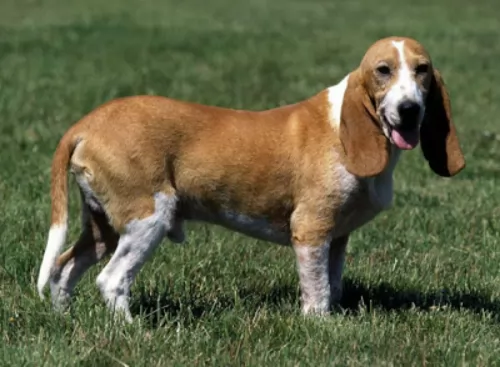 Originating in Switzerland, the Schweizer Niederlaufhund was established around 1900, when hunting became restricted to districts. The Swiss hunter needed a slower dog for the limited territory they could hunt in. Crossing selected Schweizer Laufhunds with Basset Hounds and other selected smaller, short legged hounds developed the Schweizer Niederlaufhund. By 1905 there was already a Schweizer Niederlaufhund Club.
Originating in Switzerland, the Schweizer Niederlaufhund was established around 1900, when hunting became restricted to districts. The Swiss hunter needed a slower dog for the limited territory they could hunt in. Crossing selected Schweizer Laufhunds with Basset Hounds and other selected smaller, short legged hounds developed the Schweizer Niederlaufhund. By 1905 there was already a Schweizer Niederlaufhund Club.
The Niederlaufhund became one of the best hunting dogs in the world, with its powerful body and ability to outhunt the Laufhund in tracking big game. Slower of course than the Laufhund it has a great sense of smell and an ability to easily find wounded animals. There are a few varieties, just like with the Swiss Hound again mostly because of their coloring. The Luzerner Niederlaufhund, the Jura Neiderlaufhund, and the Schwyzerlaufhund. They have musical voices that they use to communicate with the hunters and each other as well as that amazing sense of smell. They can hunt for hours without tiring and without much information from the hunter.
They are a cross breed not recognized by the larger kennel club such as the AKC and the UKC. They are recognized by the Dog Registry of America, Inc. (DRA), the American Canine Association Inc. (ACA) and most importantly by the Federation Cynologique Internationale (FCI). This last one is important because it could lead to recognition as a new breed by the UKC and the AKC.
 A massive, powerful and muscular Molosser, the Bulgarian Shepherd is strong, agile, powerful and fast. They are intelligent and reliable. They have a long, thick, harsh coat in white with patches of black. Their skull is massive and broad with a furrowed forehead. The muzzle is massive as well while the nose has wide nostrils and is fairly large. It has close fitting, thick lips with strong, scissor bite jaws. The Bulgarian Shepherd’s eyes are deep, oblique and small. They are either hazel or dark. They have an intelligent and confident, yet firm almost grim expression.
A massive, powerful and muscular Molosser, the Bulgarian Shepherd is strong, agile, powerful and fast. They are intelligent and reliable. They have a long, thick, harsh coat in white with patches of black. Their skull is massive and broad with a furrowed forehead. The muzzle is massive as well while the nose has wide nostrils and is fairly large. It has close fitting, thick lips with strong, scissor bite jaws. The Bulgarian Shepherd’s eyes are deep, oblique and small. They are either hazel or dark. They have an intelligent and confident, yet firm almost grim expression.
Their ears are low set, small and v-shaped. They sit close to the head which sits on a powerful but short neck. They have a broad back, well-muscled body with a deep chest and long, rough tail. Their gait is a trot with a spring in their step. There are two types of coats – longhaired and shorthaired with no undercoats.
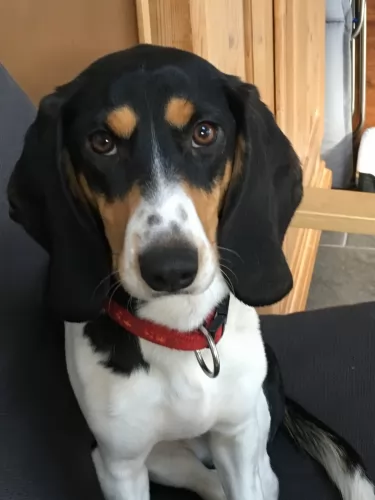 The Schweizer Niederlaufhund is a medium size, short dog. They look like their cousins, the Schweizer Laufhund but smaller. Their body is just slightly longer than it is tall, so you are left with the impression of a mostly square dog. The Niederlaufhund is well put together, with strong legs, a noble head, long droopy ears, broad chest, and a low held tail.
The Schweizer Niederlaufhund is a medium size, short dog. They look like their cousins, the Schweizer Laufhund but smaller. Their body is just slightly longer than it is tall, so you are left with the impression of a mostly square dog. The Niederlaufhund is well put together, with strong legs, a noble head, long droopy ears, broad chest, and a low held tail.
The Small Lucerne Hound has a white cote with smooth speckles of black or gray making them appear to be blue.
The Small Bernese Hound has a tricolor coat of white, tan and black. There are tan marks on the eyebrows. There is a wire haired Small Bernese as well. He has a short beard.
The Small Schwyz Hound is smooth coated in white with orange or yellow-red patches. The wired haired version is extinct.
The Small Jura Hound is a single coated dog with a black coat and tan marking above his eyes as eyebrows as well. He might have some white as well.
 This is a working dog, intelligent and independent guard dog. Reserved around strangers but loyal and devoted with his family. Tolerant of children in their family if they were raised with them. Not only will she defend human family members, she will guard and defend household pets as well. He is quite capable of making her own independent decisions. These are very intense guard dogs that will respond aggressively if they think their people are being attacked.
This is a working dog, intelligent and independent guard dog. Reserved around strangers but loyal and devoted with his family. Tolerant of children in their family if they were raised with them. Not only will she defend human family members, she will guard and defend household pets as well. He is quite capable of making her own independent decisions. These are very intense guard dogs that will respond aggressively if they think their people are being attacked.
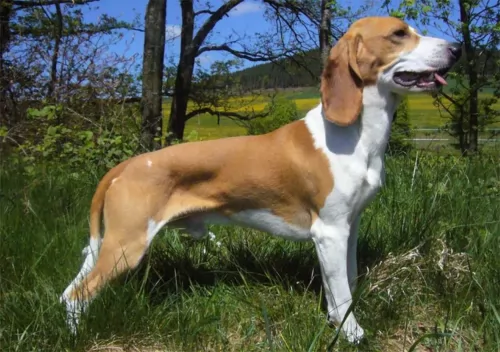 Children friendliness – yes, they are but use caution around small children and small prey.
Children friendliness – yes, they are but use caution around small children and small prey.
3. Adaptability - needs room to run and explore – is very frustrated when confined.
 The breed itself is known to be healthy but they do face some of the usual health issues of the massive, giant breeds. This includes knee and elbow dislocation; hip dysplasia; bloat; entropion and osteosarcoma. All of these conditions require medical intervention, but bloat and osteosarcoma are the deadliest. Bloat needs immediate attention and osteosarcoma is a deadly bone cancer.
The breed itself is known to be healthy but they do face some of the usual health issues of the massive, giant breeds. This includes knee and elbow dislocation; hip dysplasia; bloat; entropion and osteosarcoma. All of these conditions require medical intervention, but bloat and osteosarcoma are the deadliest. Bloat needs immediate attention and osteosarcoma is a deadly bone cancer.
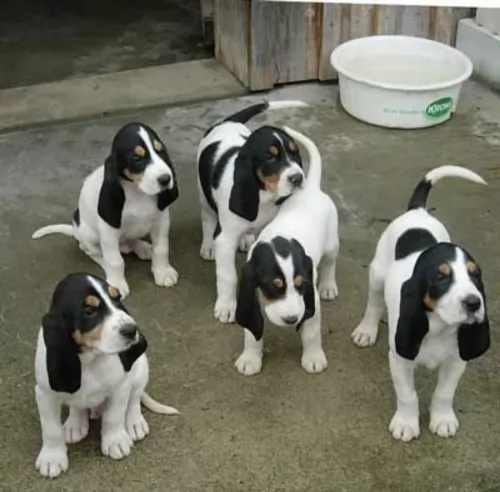 The Niederlaufhund Is prone to a very medical issues to keep an eye on. They include:
The Niederlaufhund Is prone to a very medical issues to keep an eye on. They include:
• Hip Dysplasia – This comes from hip joints that are not well formed and cause reduced mobility and pain. Parents can be tested before the dogs are bred to make sure their hips are good, and that dysplasia will not be passed to puppies. This dysplasia can cause arthritis and even lameness.
• Ear Infections – With long drooping ears it is easy for the dog to acquire ear infections. This is even more so for a hunting dog like the Niederlafhund. It is important to clean the dog’s ears on a regular basis.
 These are large dogs with large appetites, but you want to keep them lean and active. Feed them at least twice a day with a high quality large or giant dog dry food. Four to five cups of food per day is the maximum.
These are large dogs with large appetites, but you want to keep them lean and active. Feed them at least twice a day with a high quality large or giant dog dry food. Four to five cups of food per day is the maximum.
Patellar Luxation – a floating kneecap or dislocated knee. Will cause lameness.
Osteosarcoma – bone cancer must be treated immediately as it is potentially fatal.
The Bulgarian Shepherd needs a good amount of exercise every day. Remember this is a working breed and they need a job. Long walks every day are essential for his well-being.
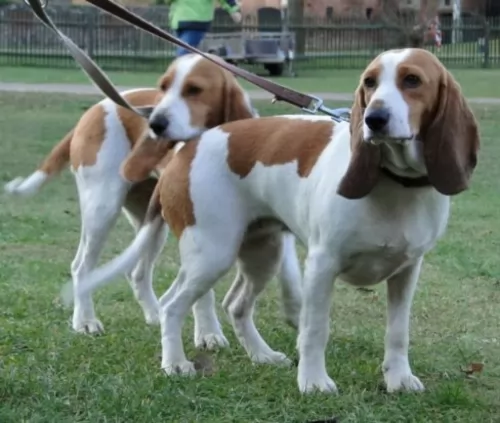 1Feeding the puppy - give 1 cup per day of high quality dog food divided into 3 meals.
1Feeding the puppy - give 1 cup per day of high quality dog food divided into 3 meals.
2.Feeding the adult – give one and one half cups of high quality dog food divided into 2 meals.
4. Games and Exercises – needs a lot of daily exercise and loves field trials, running and activities like barn hunt.